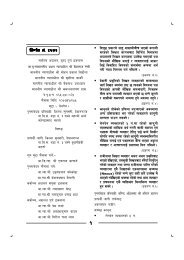The Nepali Judiciary - Supreme Court Of Nepal
The Nepali Judiciary - Supreme Court Of Nepal
The Nepali Judiciary - Supreme Court Of Nepal
You also want an ePaper? Increase the reach of your titles
YUMPU automatically turns print PDFs into web optimized ePapers that Google loves.
and data retrieval has been introduced. <strong>Court</strong> Work Description Guidelines, 2064, 84 has been<br />
enacted which includes work description of human resources prescribed for each branch and<br />
division of the courts. <strong>The</strong> National Judicial Council has been conducting study on case flow<br />
management. 85<br />
In order to strengthen the managerial capacity of the judiciary and to make it competent and<br />
effective and in order to identify reforms and management policies a High-Level <strong>Court</strong><br />
Management Development Committee has been constituted. 86 <strong>The</strong> Committee has recommended<br />
for implementation of differentiated case management for different cases. In addition to this, the<br />
Committee has also suggested for case unit management on the basis of clustering of cases,<br />
application of separate standards for separate courts regarding disposal of cases, determination of<br />
time table, status of manpower and work should be entrusted pursuant to the work load, case<br />
hearing management. For the purpose of identifying and determining the disputed matters, the<br />
Committee also suggested for improvement in the current due date system and also suggested for<br />
application of information technology with regards to case management. Likewise, the Committee<br />
also suggested for updating the archiving system, provision of specialized benches and<br />
implementation of panel system.<br />
3.3.15 To institutionalize legal aid<br />
Under this the Plan proposed a number of activities such as institutionalization of legal aid services<br />
to the poor and disadvantaged groups, creation of attractive emoluments and benefits for court<br />
appointed lawyers, expansion of services of these lawyers to drafting of plaints, defenses, appeals<br />
and undertake all other important activities including the activities during the execution of decision.<br />
In order to strengthen their capacity, the Plan also proposed to provide logistic support to these<br />
lawyers and periodically evaluate their performance by maintaining the record of their activities.<br />
In order to carry out the assignments a Committee headed by a <strong>Supreme</strong> <strong>Court</strong> justice 87 was<br />
constituted to conduct a study and make recommendations and suggestions regarding legal aid<br />
services to the poor and disadvantaged groups. <strong>The</strong> Committee made a number of<br />
recommendations and suggestions such as appointment process of court appointed lawyers, their<br />
work, remuneration, conditions of service and other privileges. Pursuant to the suggestions made,<br />
conditions of services and appointment process of court appointed lawyers have been included in<br />
the <strong>Supreme</strong> <strong>Court</strong> and District <strong>Court</strong> Regulations. 88 A guideline containing the appointment<br />
process and conditions of services of court appointed lawyers has been prepared and has been<br />
submitted by the Plan Implementation Committee for discussion at the Full <strong>Court</strong>.<br />
3.3.16 To institutionalize information system in judicial activities<br />
Activity relating to institutionalization of information system in legal works was not proposed as a<br />
strategic intervention in the original Plan. <strong>The</strong> mid-term review proposed to include this activity as<br />
one of the strategic intervention. Under this, various activities have been proposed such as: judicial<br />
activities and data of legal information, decision and order of the court, weekly and daily cause list,<br />
publications of court, monthly and annual activities, research reports, retrieval of current and<br />
documented cases and system of monitoring and inspection of records, system of dissemination of<br />
84 <strong>Court</strong> Work Description Guidelines, <strong>Supreme</strong> <strong>Court</strong>, <strong>Nepal</strong>, 2064<br />
85 Research report regarding status of case flow submitted by Mr. Til Prasad Shrestha, Mr. Rishi Ram Acharya, Mr.<br />
Tika Ram Acharya, 2064 Ashad<br />
86 Honorable Justice Min Bahadur Rayamajhi, <strong>Supreme</strong> <strong>Court</strong>, headed this Committee which was constituted on<br />
2065/9/3<br />
87 Honorable Justice Anup Raj Sharma, <strong>Supreme</strong> <strong>Court</strong><br />
88 Rule 111 (b) of <strong>Supreme</strong> <strong>Court</strong> Regulation, 2049 and Rule 95 (a) of District <strong>Court</strong> Regulation, 2052<br />
40




![lg0f{o g+=&(&# g]=sf=k= @)^% ;af]{Rr cbfnt ljz]if Ohnf; ;DdfggLo k ...](https://img.yumpu.com/10045627/1/190x245/lg0fo-g-gsfk-afrr-cbfnt-ljzif-ohnf-ddfgglo-k-.jpg?quality=85)
![lg0f{o g+=&(@% g]=sf=k= @)^% ;jf]{Rr cbfnt, ljz]if Ohnf; dfggLo ...](https://img.yumpu.com/6479513/1/190x245/lg0fo-g-gsfk-jfrr-cbfnt-ljzif-ohnf-dfgglo-.jpg?quality=85)

![lgj]b s ljkIfL - Supreme Court Of Nepal](https://img.yumpu.com/5482729/1/190x245/lgjb-s-ljkifl-supreme-court-of-nepal.jpg?quality=85)